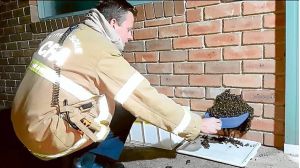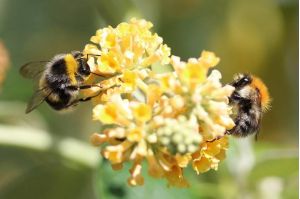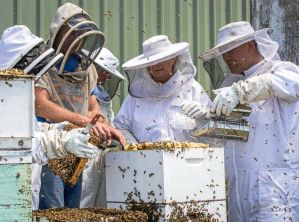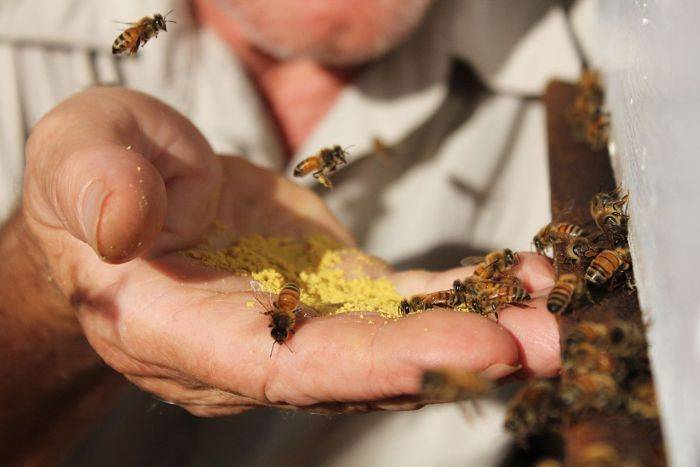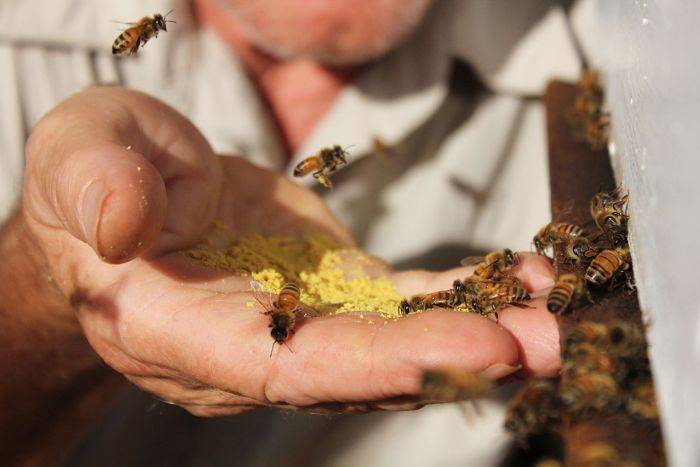
PHOTO: Urban beekeeping in Sydney has grown rapidly over the last couple of years. (ABC: Emma Sleath)
Sydney has seen an explosion in urban beekeeping with a 20 per cent increase in the number of people taking up the hobby in just a couple of years.
That's great for the environment, with bees our most valuable pollinators for agricultural crops and even urban backyards
But what if you have an allergy or reaction to bee stings, or a backyard pool where bees like to get their water and you need to make a complaint?
Tony Deguara lives in Sydney's inner west with a backyard bee enthusiast neighbour over his back fence.
Tony told Curious Sydney his neighbour started out with two beehives, but the number increased to six meaning he was living next to thousands of bees as a result.
He asked: "Why do Sydney councils encourage urban bee keeping but appear to have no regulations to manage the hobby? Consequently if you have problems you have to go to the Department of Primary Industries [DPI]".
That was the question ABC News in Sydney was asked to investigate through Curious Sydney, our series that reports on stories based on your questions.
"I started having major problems with my neighbour — not because he was keeping bees but because he was keeping what I thought was an inordinately high number of bees," Mr Deguara said.
Tony has a bad allergic reaction to bees. While not anaphylactic, they leave him with infections and swellings that last for weeks.
After the last sting, an infection in his foot required antibiotics.
When he asked his neighbour to reduce the number of beehives, initially his neighbour complied, but over time the number of hives crept up again.
Tony sought advice from his local Inner West Council to help him manage the issue, but the council redirected him to the DPI.
Curious Sydney found that the answer to Tony's question is complex. Councils can manage bees if they choose to classify them under the companion animal act like pet dogs and cats, but each council has different rules.

PHOTO: Worker bees on a frame on a rooftop hotel in Sydney. (ABC Rural: Sarina Locke)
Why are complaints handled by a government department?
Anyone who wants to keep European honey bees needs to register with the DPI, which has oversight in NSW under its biosecurity division.
Beekeeping complaints in 2017
- 119 total complaints from July 1 to December 31 2017 — a slight increase on 2016
- 70 nuisance bee complaints
- 34 general complaints
- 5 abandoned hive complaints
- 10 disease identification complaints
If there's an outbreak of disease in the bee population that could threaten Australia's crops and environment, the department needs to keep beekeepers informed.
The DPI's director of compliance in NSW, Peter Day, said registration was important because pests and diseases could result in lost production and increased costs.
"It allows us to identify owners of beehives and know where the hives are located and communicate with them if there's ever an outbreak of disease outside of Australia," he said.
Mr Day said beekeepers also have to be aware of how to identify American foulbrood and varroa mite, a disease which has decimated European honey bees all over the world.
DPI handles complaints about bees if they are a danger to public health or safety, a public nuisance, or "kept on premises that for a specific reason are considered unsuitable for beekeeping".
What is local government's role?
Local government does play a role and a quick look at the websites of different local council's across Sydney shows a confusing variety of approaches.
Sydney local councils and bees
- Ku-ring-gai Council offers residents a bee hive inside a protective foam box for its native bee "tetragonula carbonaria"
- City of Sydney supplies native beehives to several community gardens
- Randwick Council holds workshops on urban beekeeping
- Penrith City Council uses the DPI's fact sheet on bees, encouraging people to register with the DPI and consult with neighbours before buying bees and hives
- City of Ryde mentions bee swarms and how to manage them
- North Sydney Council encourages residents to find out more and keep a backyard hive
- Parramatta City Council — maximum of four bee hives can be kept per premises with prior development approval from council for more than that number
- Blacktown City Council — conducts seminars about native beekeeping
President of the NSW Amateur Beekeepers Association, Bruce White, says historically local councils have controlled beekeeping through the Local Government Act, where bees are classified as companion animals.
But he said every council was different and with the push towards urban beekeeping, local government guidelines were not clear.
"It is a problem and things should be clear, that's why we encourage beekeepers to join a beekeeping association before they even get beehives so they understand how they should be kept and best management practices and get docile races of bees," he said.
In one example, Ku-ring-gai Council won awards for its program aimed at conserving its native bee "tetragonula carbonaria", with residents given a bee hive inside a protective foam box on the ground.
But many other councils make no mention of beekeeping at all.
DPI's guide to hive numbers
- Small block - 2 hives
- Average block - 4 hives (up to 1000 m2)
- Roomy - 8 hives (up to 2000m2)
- Rural - No limit
Tony Deguara said he would like to see councils take more responsibility, especially the ones that encourage beekeeping.
"I think they should put a limit on the number of bees — they could quite simply say if your garden is any bigger than this you can only have two beehives," he said.
"In all fairness I think regulations should clearly state that the beehive has to be halfway between your home and your neighbour's house and not on their back fence."
'A whole lot of people with no knowledge'
There are 6,500 beekeepers in NSW, 5,000 of whom are recreational — roughly a 20 per cent increase over two years.
The spike in interest can partly be put down to the advent of the Australian invention the Flow Hive, which allows honey to be mechanically harvested via a tap without opening the hive.
There's also a growing desire to maintain numbers for pollinating gardens and food crops, with bee communities under threat worldwide.
The DPI admits there could be a lack of awareness amongst the general public about bees and the department could work more closely with local government to make sure residents have the information they need.
Bruce White welcomes the enthusiasm of backyard beekeepers but is shocked by the level of ignorance in the community, which poses a real challenge for both the DPI and beekeeping associations.
"With the advent of the Flow Hive, which is a fantastic Australian invention, there's been a huge increase in the number of people that have got bees but no knowledge," he said.
More and more people are keeping native 'stingless' bees which provide small amounts of honey and don't need to be registered, Mr White said.
'Bees have a place'
Of course the perception of risk in the community is raised by instances where people have been hospitalised after being stung by bees and died as a result, and by bee swarms like the one in Sydney's CBD in November 2017.

PHOTO: A bee swarm settled on a motorbike in Sydney's CBD in November. (Twitter: @NSWPolice)
A report found that between 2000 to 2013 bee and wasp stings killed 27 people in Australia, while almost 42,000 people went to hospital as a result of bites or stings, with bees and wasps responsible for just over a third of them.
There has been a very slight increase in complaints about urban beekeeping over the last six months, with about 100 complaints mostly about nuisance bees, DPI's Mr Day said.
Most of those are sorted out by providing information and facilitating conversations between neighbours.
But if a person has an allergic reaction to bees, the DPI would have no hesitation about removing hives immediately, he said.
"If you're interested in having bees in your backyard the first thing we would always recommend is that you discuss that with your neighbours," he said.
"[That way] they're fully aware and also you're aware if anyone has an allergy and you can put measures in place."
Mr White said urban beekeepers need to join associations or bee clubs to ensure the insects are properly managed and don't become a problem for neighbours.
By Sue Daniel for Curious Sydney
Updated 15 Mar 2018, 12:09pm

